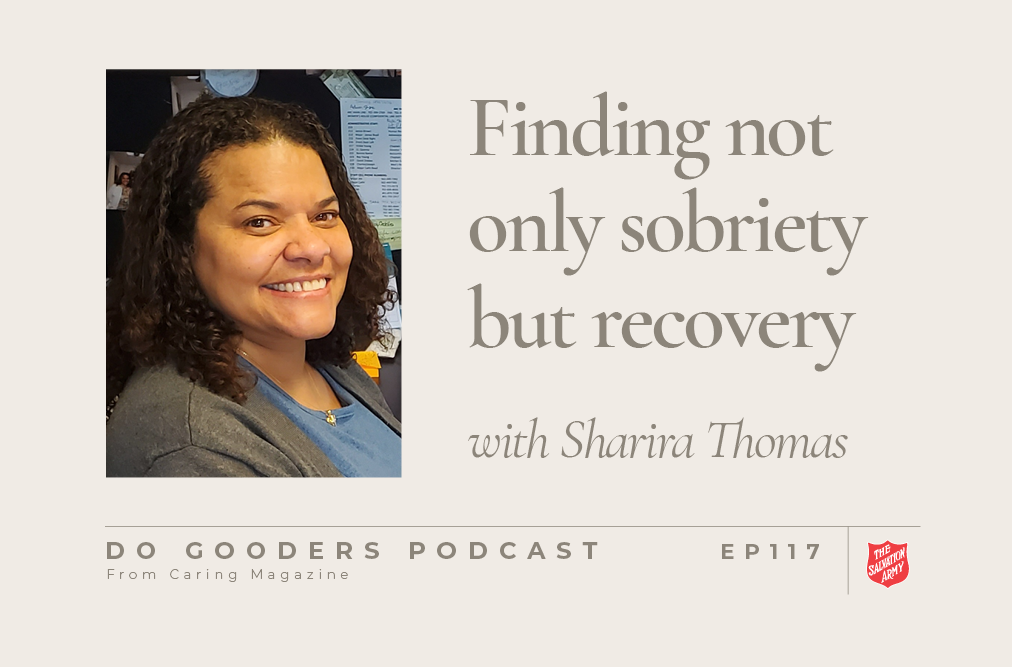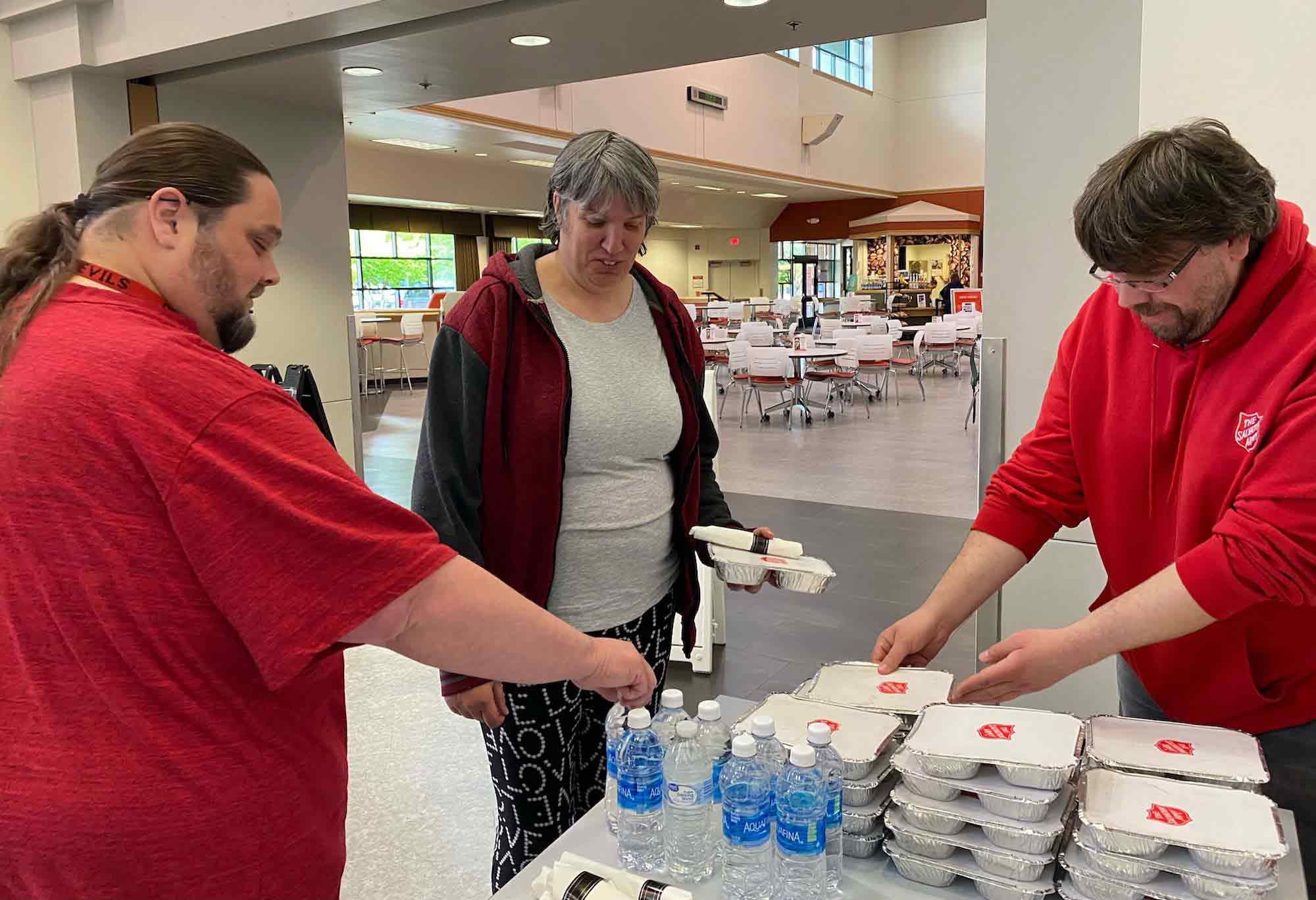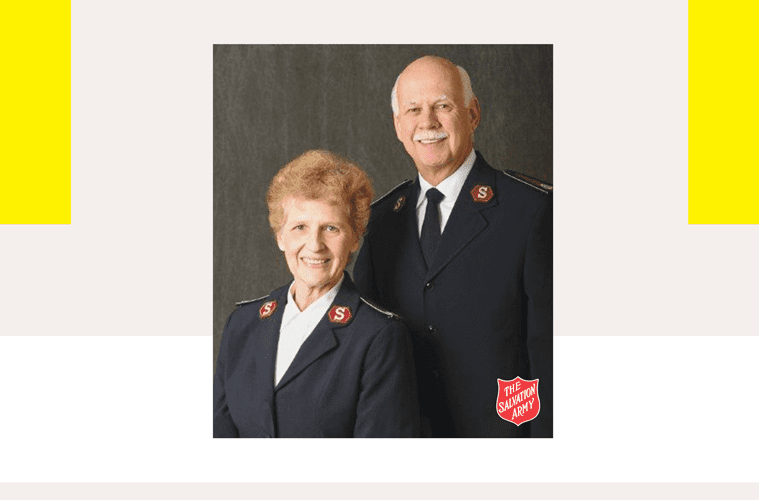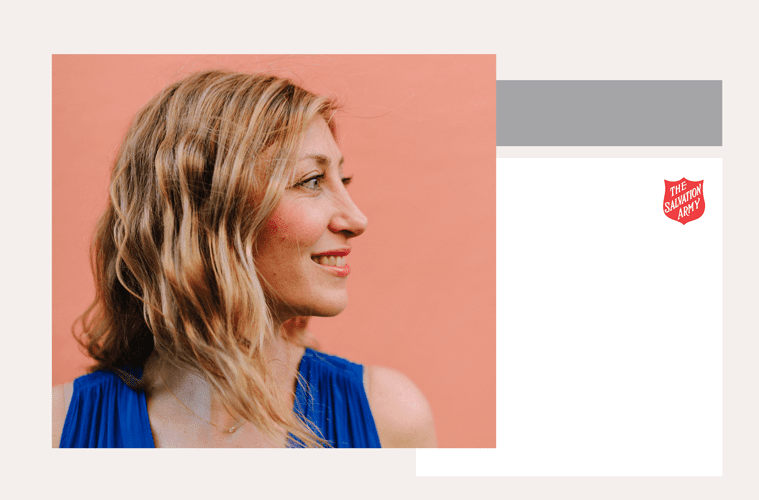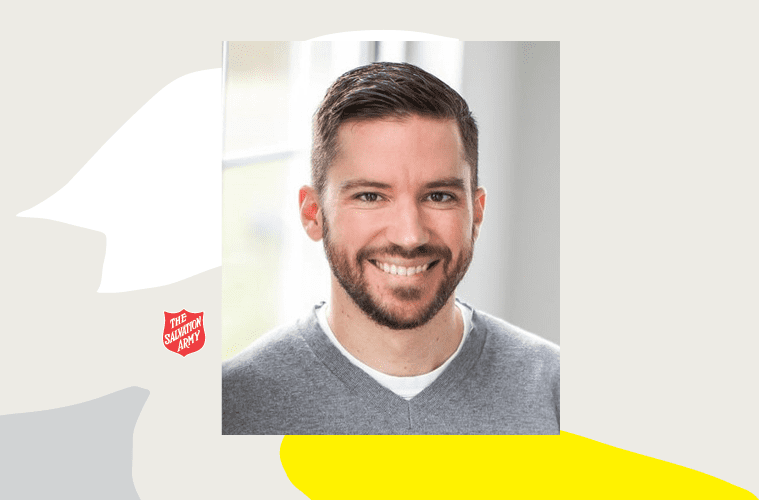According to the National Center for Drug Abuse Statistics, there have been 700,000 drug overdose deaths in the U.S. since 2000.
Sharira Thomas was nearly one of them.
For 30 years, she lived a life of addiction that landed her in prison.
And three separate times, she returned to The Salvation Army for help.
For more than 100 years, The Salvation Army’s Adult Rehabilitation Centers and Harbor Light Programs have offered cost-free residential rehabilitation programs to treat the symptoms, and ultimately the root causes, of prolonged alcohol and drug dependence.
And it’s not limited to a certain “type” of person. Addiction can affect anyone.
That’s why The Salvation Army equips more than 150,000 people every single year to combat addiction, regain health and stability, build work and social skills and restore families.
With more than 130 residential treatment facilities in America, The Salvation Army is out to break the chains of addiction. To help people find not only sobriety, but recovery.
To help them experience transformation.
And today, Sharira is one of those stories.
She is now the Intake Coordinator of The Salvation Army Las Vegas Adult Rehabilitation Center, which means she’s one of the first points of contact for those coming into the program. She gets to tell them there is hope.
And she knows firsthand.
Show highlights include:
- The highlights of Sharira’s story.
- What Sharira does as the Intake Coordinator of The Salvation Army Las Vegas Adult Rehabilitation Center (ARC).
- What the ARC program is and why it’s important to her.
- What it’s like to face and fight addiction.
- What Sharira learned through it all.
- Why Sharira loves The Salvation Army.
- How she relates now to those coming into the ARC.
- What it means to hear herself referred to as a role model for other women.
- What Sharira would say to someone struggling with addiction today.
Listen and subscribe to the Do Gooders Podcast now. Below is a transcript of the episode, edited for readability. For more information on the people and ideas in the episode, see the links at the bottom of this post.
* * *
Christin Thieme: Well, Sharira, welcome to The Do Gooders Podcast. And thank you so much for joining me today.
Sharira Thomas: Oh, thank you for having me. It’s my pleasure.
Christin Thieme: Can you tell me a little bit about your story, some of the highlights of what brought you to today?
Sharira Thomas: Okay. So for me, I kind of struggled with feeling different, feeling uncomfortable and just feeling different than everybody else ever since I was young. I grew up in the Bay Area and at about 13 years old, I started to discover that I could change the way I feel with drugs, alcohol, relationships. And so I started very young with addiction.
As I grew older, it kind of got deeper. When I was about 19, I had just had a baby and I became introduced to methamphetamine. That sent me off and running on about 30 years of addiction with that drug. Throughout that time, I became involved in crime in order to support my habit. And I had my first stay at The Salvation Army Adult Rehab Center.
I was kind of scared straight if you will. They had threatened to send me to prison. And so I decided to go ahead and go to The Salvation Army. I enjoyed about seven years of sobriety from participating in the program, but as time went on, I started to kind of forget what my past has been like with the addiction, and started to think that I could be a normy, if you will, a normal person. That I didn’t need a recovery program.
So I started drinking with my coworkers after work and very soon it ended up back to my drug of choice, which was meth at the time. It took about a year for me to lose my job, and another six months to end up in prison. In this time of sobriety, I’d had a third child who was never supposed to see any of that kind of stuff. He was supposed to be my sobriety baby, was supposed to be sheltered from that kind of a lifestyle.
So I went to prison. I came out of prison, and I was just hopeless. I didn’t see a future for myself. I thought that I was going to be nothing but a drug addict and a criminal for the rest of my life. It just seemed bleak. I went on in that same path for quite a while, and I got to a point where I was at an age where I just felt like this was dumb. I was involved in crime and drugs and I felt like I was wasting my life and I really wanted out of it. I wanted to be sober.
And I remembered that Salvation Army had saved me before, so I headed back down to The Salvation Army. I wanted to get clean, but I wasn’t willing to do any of the things that they asked me to do. They asked me not to talk to the men and at this point I had such a low self-esteem and I needed validation from others, so I couldn’t not talk to the men. I needed outside validation. So I had a real hard time with that and I wouldn’t follow any of the other rules either. So eventually I got myself asked to leave.
When I left that program, I went very deep into addiction. I was a IV drug user. I started using heroin and I had an overdose in the summer of 2019. That kind of was a little bit of a wake up call, but not enough to stop using at that point. A couple months later, I was arrested and I knew that I was going to go back to prison if I didn’t do something.
So I decided I’d bail out and I’d go to The Salvation Army Adult Rehab again. It had been about six months, which was the time they told me that I would be welcomed back in. So I headed back over to Salvation Army. In my previous days at Salvation Army, I’d tried to get the relationship with God. I knew there was a God, but I’d never felt like he was for me. I knew that he created everything. He created me, created you, but I didn’t feel like he loved me or cared about me because I was so miserable all the time.
I saw people in churches, in the pews, that were saying, “Praise the Lord, hallelujah. I’m so blessed.” And that didn’t feel like me. I thought that’s the people that he loved, the people that could follow his rules, and that was his people. I kind of had heard, I paid attention when they had told me that my past didn’t define me, that I could be a brand new creature in Christ, but I just didn’t know how to do it.
So I got back to The Salvation Army on November 12th. On November 17th, which was about five days, my mother came down to the Adult Rehab Center. She told me that my son had shot himself, and he wasn’t going to make it. He had struggled with schizophrenia, voices and hallucinations, and he had just gotten to the point where he couldn’t handle it anymore.
Christin Thieme: I’m so sorry.
Sharira Thomas: Thank you. Thank you. When that happened, I just wanted to die, Christin. I wanted to get high for sure, and I wanted to die my own self. I had a sponsor who I had reconnected with in those five days I’d been back for treatment who had told me we don’t get high no matter what. This is going to be the worst thing that ever happens to you, and if you can get through this, you can get through anything.
At that point, I started to cry out to God. For most people, they might have been angry with God, but for me it was just par for the course. I’d been miserable my whole life. This was nothing new, you know? And something happened for me. God was there. I cried out to him and he showed up in my life in a big way. I knew that he was walking me through this pain. I knew that he was real. I knew that he cared about me and loved me.
And so I started to really get into the Word. I started to read my Bible. It was very comforting to me. I was at The Salvation Army still. They offered to let me go home and grieve, and come back later. And I was like, “Uh-uh (negative). If I leave here, I’m going to definitely use.” I was like, “Please let me stay,” and they did. And the people of The Salvation Army just surrounded me with love and comfort. It was just amazing. It was incredible. You know, I’ve never felt such fellowship as I did then.
So, because I had the mentality of a criminal and I always was trying to see if I could get more and more and more, I was like, “Okay, God, what else you got?” He wants us to depend on him like that. He wants us to come to him with every single thing, and that’s exactly what I did. He gave me a gift of remembering to take all of my issues to him.
For example, even though I was in treatment and I wasn’t using, I still wanted to. It still crossed my mind a lot. So I asked him for help with that, and he helped me with that. I asked him to help me not want to commit crimes or be a liar and a thief anymore. So I took those things to him. I was still lustful. I still had really low self esteem. I took those things to him.
My anxiety, my fear, my depression, each one of those things I took to him and slowly but surely, I started to notice that I was changing, that my heart was changing. And eventually I got to the point where I was like, “Okay, God, what can I do to repay you for these gifts you’ve given me?” I was a baby Christian. So I didn’t realize that there was nothing I could do to repay those things, but I still wanted to serve him. I wanted to be a part of what The Salvation Army had done for me. They had given me love and support and hope, and they believed in me when I felt like I didn’t believe in myself and nobody else could either.
So I decided I’m going to work for The Salvation Army and I don’t care what I do. If I have to clean the toilets, I want to be a part of this organization. So when I completed the program, I applied for a job at one of the stores. And then I eventually worked in the warehouse. I had some work experience in things like HR and administration, so when the intake coordinator job came up, I was like, “I can do this.” It felt like that was a job for me.
But when it was open, I had just graduated. So they were like, “Eh, I don’t know if this is a little soon for you.” And also there was a person that was really qualified for the job that they put in the position. So I worked in the warehouse, and about six months after that, that person got a different job and that opportunity opened back up and they asked me if I wanted to interview for it. And it was just like, God was saying, “Okay, here’s this opportunity for you.”
Christin Thieme: Now’s the time.
Sharira Thomas: Now’s the time. Yes, exactly. On paper, it didn’t seem like it was a good choice. I talked about the criminal aspect of my story, and so on paper, some people would be like, “What?” You know, I’m still on probation. I’ll be released pretty soon, but right now I’m still on probation, and I’ve done a lot of things in my past. And when I was praying for this job, because I did, I prayed without ceasing for this job. I thought, The Salvation Army’s been telling me your past doesn’t define you. You can be brand new. And I said, “Well, this will tell me whether or not that’s true.”
Christin Thieme: And proof of it.
Sharira Thomas: Yeah, this is proof. So I got this job. And Christin, this is my little ministry. Every single person that comes into the intake office at the Salvation Army Adult Rehabilitation Center Las Vegas is going to hear about God and Jesus Christ. They’re going to hear my story, and they’re going to hear about what he can do in their life if they’re willing.
The same things that Salvation Army pumped into me, which was the hope, the past doesn’t define you, new creation puts your shame and your guilt at the foot of the cross. I tell that to every single person that walks through this door. There’s something about seeing that hope start to glitter in someone’s eye that just is amazing, you know? This place changed my life in an incredible way, and I just want to see it do the same thing in others.
Christin Thieme: That’s amazing. I mean, you’re the perfect person to be sharing that with people coming in. Your story, I mean, what a story. I’m just want to say I’m so glad that you’re here to tell it, and that you kept coming back to The Salvation Army. It’s a good thing, and I’m just honored that you’re willing to share your story with us. You said you’re the intake coordinator of The Salvation Army Las Vegas Adult Rehabilitation Center. Can you share more for somebody who doesn’t understand what exactly that means? What exactly is your role? What do you do?
Sharira Thomas: Okay. So the Adult Rehabilitation Center is a six-month program. It’s a faith-based program and it’s designed to help people who are struggling with addiction have a structure, live a life of recovery. So while they’re here, they will have classes. They’ll have counseling. It’s a work therapy program. While they’re here, they’ll have three different work therapy assignments designed to help them build skills, be responsible, be accountable.
The Salvation Army Adult Rehabilitation Centers are all funded by the thrift stores. That’s where we get our funding from. So beneficiaries that are part of our program, clients will work in our Salvation Army warehouse processing donations for those thrift stores. So while they’re here, they’ll have the work therapy assignments. They’ll have classes and counseling. Classes like anger management, relapse prevention. They’ll get sponsors. They’ll go to meetings. They’ll do steps. At the end of the six months, we’re hoping that they have developed a routine that they could take with them. We go to chapel twice a week, and Bible study on Mondays.
My role here is to do the admission. So if someone indicates interest for a treatment, then they’ll come see me, or they’ll talk to me on the phone, and we’ll go over their eligibility requirements. We’ll talk and figure out if this is a good fit for them, and then I help them get enrolled in the center. And of course, like I said, I get to tell them about Jesus Christ on the way.
Christin Thieme: Yeah. I love it. What is it like? I mean, for somebody who’s never been there, what is it really like to face and fight addiction?
Sharira Thomas: Well, it’s like wanting to be a good person and not having any of the tools to do so. For most addicts, they really want to stop using, and they kind of usually wonder how they got here in the first place. It’s like being enslaved to something and with no way out. After a while, it turns into a hopeless situation where you have no hope of getting out either. You think that this is just the way it is. This is your destiny. For me, it was I’m just going to be a drug addict forever. There’s nothing I can do to change it.
And that’s why it’s so important for the detox. A lot of people go through detox for alcoholics. It’s even worse because it’s very dangerous to just stop drinking medically, you could have seizures or die. So it’s just a trap. You feel trapped and you feel hopeless and you feel like a bad person. But it’s a disease. It’s a disease and it can be treated. The biggest part of getting help is just to be willing. That’s half the battle.
Christin Thieme: Yeah.
Sharira Thomas: You know, a little bit of hope, a whole lot of faith and a whole lot of willingness. You got to be willing. But like I said, it’s a treatable disease, and if someone’s willing, they can get out of it like I did, like many people do. The Salvation Army Adult Rehab has about a 30% completion rate, which is compared to like a 3% for other treatment centers. So the formula works and they’ve been doing this for a long time.
Christin Thieme: Yeah. The Adult Rehabilitation Center program, what does it mean to you? Why is it so important to you?
Sharira Thomas: Oh! Well, besides the fact that they save my life, I get to help others. Everybody that walks into my office, I can relate to their story. They can relate to mine. With the 30 years that I’ve spent in the darkness, lost in the darkness, I have a lot of experiences. So when someone comes in here and tells me that they feel hopeless, or they feel like they can’t change because of a certain thing, whether it be prison or losing their children, I can relate to that and I can show them, “You know what? If I can do this, anybody can.”
I absolutely love seeing the beneficiaries. We call the clients beneficiaries, by the way. I love to see them grow. I love to see them start to find hope. So I’m at every chapel. I’m at every Wednesday graduation, because it’s just this place saved my life. It saves so many people’s lives, and it’s so important to our community to have a place where people can go and change their lives.
Christin Thieme: Absolutely. One of the ARC chaplains and counselors, Vicky Young, said that you are a role model for other women. What does it mean for you to hear that today?
Sharira Thomas: Man, you know, I never thought I would hear something like that. I’ve never in my wildest dreams, heard, thought that I would hear somebody call me a role model because that’s not the way I’ve lived my life up until now. So this Sunday I get enrolled as a Salvation Army soldier.
Christin Thieme: Oh, congratulations!
Sharira Thomas: Thank you. I’m very excited. It’s the commitment to be an example for others. It’s so important to me because it’s something I never thought anybody would look at me and think role model, or example for others. It was always, “Don’t be like that girl. Whatever she’s doing, do the opposite.”
So earlier I told you about me thinking that God was for all those people in the pews that were saying, “Hallelujah, Praise the Lord.” And they’re so blessed. And that’s me now.
Christin Thieme: Yes.
Sharira Thomas: I’m that person now. I do that now, because I am.
Christin Thieme: That’s great.
Sharira Thomas: I’m absolutely blessed.
Christin Thieme: That’s so cool. I love that.
Sharira Thomas: Yeah.
Christin Thieme: So what do you say to someone who comes in, maybe somebody who’s listening, who’s struggling with addiction, who doesn’t have a lot of hope? What is your encouragement to them?
Sharira Thomas: So my prayer for anybody who is struggling with addiction, that they know that their past mistakes don’t define them and they could have a brand new life. It starts right when they make that decision. They can be a brand new creation in Christ. They can take all of their guilt, and all their shame, and all their mistakes, and all their fear. They can put it right at the foot of the cross of Jesus Christ, and he’ll bear those burdens for them as long as they ask.
All they’ve got to do is ask and repent, say that they’re sorry, and they want to be different, and they can start a brand new life. You know, I sat in this chair in my office, hopeless, thinking that there’s nothing else for me. And God can do whatever he wants. He has a plan for each and every one of us. He just needs us to want to live in his will. So, yeah.
Christin Thieme: Yeah. It’s not just for certain people, like you thought at one point, but for anyone.
Sharira Thomas: Yeah. It’s for everybody. His Word says that he so loved the world that He gave His only begotten Son, that whoever—whosoever, anybody—believes in Him should not perish but have everlasting life (John 3:16 NKJV).
Christin Thieme: Well, Sharira, thank you so much for sharing your story. Like I said, I’m so happy that you have found this perfect role for you in The Salvation Army, that you have the chance to encourage so many people. And congratulations again on becoming a Salvation Army soldier, a member of the church. We’re just excited for you and can’t wait to see what’s next for you in your life.
Sharira Thomas: Thank you so much for having me. I appreciate it.
Additional resources:
- See how The Salvation Army fights addiction.
- Read the story of one ARC grad who helps others get jobs in the culinary industry.
- Get inside the Caring Magazine Scripture Study Collection and find a suite of free, downloadable Bible studies to guide you through topics from New Beginnings Through Forgiveness, to Understanding our Imago Dei or Life Hacks From David.
Listen and subscribe to the Do Gooders Podcast now.











